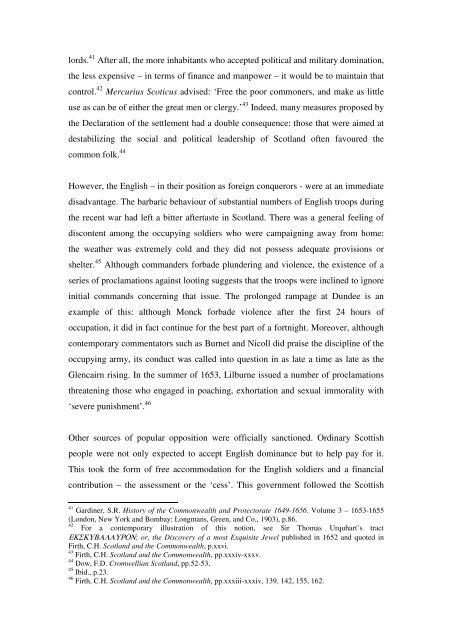The Glencairn Uprising, 1653-54 Helen Baker Department of ...
The Glencairn Uprising, 1653-54 Helen Baker Department of ...
The Glencairn Uprising, 1653-54 Helen Baker Department of ...
You also want an ePaper? Increase the reach of your titles
YUMPU automatically turns print PDFs into web optimized ePapers that Google loves.
lords. 41 After all, the more inhabitants who accepted political and military domination,<br />
the less expensive – in terms <strong>of</strong> finance and manpower – it would be to maintain that<br />
control. 42 Mercurius Scoticus advised: ‘Free the poor commoners, and make as little<br />
use as can be <strong>of</strong> either the great men or clergy.’ 43 Indeed, many measures proposed by<br />
the Declaration <strong>of</strong> the settlement had a double consequence: those that were aimed at<br />
destabilizing the social and political leadership <strong>of</strong> Scotland <strong>of</strong>ten favoured the<br />
common folk. 44<br />
However, the English – in their position as foreign conquerors - were at an immediate<br />
disadvantage. <strong>The</strong> barbaric behaviour <strong>of</strong> substantial numbers <strong>of</strong> English troops during<br />
the recent war had left a bitter aftertaste in Scotland. <strong>The</strong>re was a general feeling <strong>of</strong><br />
discontent among the occupying soldiers who were campaigning away from home:<br />
the weather was extremely cold and they did not possess adequate provisions or<br />
shelter. 45 Although commanders forbade plundering and violence, the existence <strong>of</strong> a<br />
series <strong>of</strong> proclamations against looting suggests that the troops were inclined to ignore<br />
initial commands concerning that issue. <strong>The</strong> prolonged rampage at Dundee is an<br />
example <strong>of</strong> this: although Monck forbade violence after the first 24 hours <strong>of</strong><br />
occupation, it did in fact continue for the best part <strong>of</strong> a fortnight. Moreover, although<br />
contemporary commentators such as Burnet and Nicoll did praise the discipline <strong>of</strong> the<br />
occupying army, its conduct was called into question in as late a time as late as the<br />
<strong>Glencairn</strong> rising. In the summer <strong>of</strong> <strong>1653</strong>, Lilburne issued a number <strong>of</strong> proclamations<br />
threatening those who engaged in poaching, exhortation and sexual immorality with<br />
‘severe punishment’. 46<br />
Other sources <strong>of</strong> popular opposition were <strong>of</strong>ficially sanctioned. Ordinary Scottish<br />
people were not only expected to accept English dominance but to help pay for it.<br />
This took the form <strong>of</strong> free accommodation for the English soldiers and a financial<br />
contribution – the assessment or the ‘cess’. This government followed the Scottish<br />
41 Gardiner, S.R. History <strong>of</strong> the Commonwealth and Protectorate 1649-1656. Volume 3 – <strong>1653</strong>-1655<br />
(London, New York and Bombay: Longmans, Green, and Co., 1903), p.86.<br />
42<br />
For a contemporary illustration <strong>of</strong> this notion, see Sir Thomas Urquhart’s tract<br />
ΕΚΣΚΥΒΑΛΑΥΡΟΝ; or, the Discovery <strong>of</strong> a most Exquisite Jewel published in 1652 and quoted in<br />
Firth, C.H. Scotland and the Commonwealth, p.xxvi.<br />
43 Firth, C.H. Scotland and the Commonwealth, pp.xxxiv-xxxv.<br />
44 Dow, F.D. Cromwellian Scotland, pp.52-53.<br />
45 Ibid., p.23.<br />
46 Firth, C.H. Scotland and the Commonwealth, pp.xxxiii-xxxiv, 139, 142, 155, 162.
















